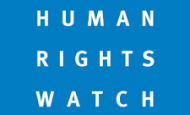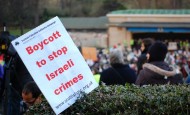The BDS Life and Times of Omar Shakir
In October 2016, Human Rights Watch (HRW) hired Omar Shakir to serve as its “Israel and Palestine Country Director.” Shakir has been a consistent supporter of a one-state framework and advocate for BDS (boycotts, divestment, sanctions) campaigns, fitting the longstanding HRW practice of hiring anti-Israel activists to serve in key positions relating to Israel.
In May 2018, due to Shakir’s BDS ties, the Israeli Ministry of Interior chose not to renew his work visa. HRW and Shakir have been appealing this decision, leading to a petition to the Jerusalem District Court to reverse the decision. On April 16, 2019, the Court rejected HRW and Shakir’s arguments and ordered Shakir to leave Israel by May 1.
Omar Shakir’s background and history of anti-Israel activity exemplifies the organization’s troubling ideological approach to Israel and retreat from the universal principles of human rights.1
Georgetown University
In 2008-2010, Shakir was a Masters Student at Georgetown University. In 2010, he participated in UC Irvine’s Muslim Student Union’s Israel Apartheid Week, giving a presentation titled “Apartheid IsReal.” In his talk, he called for abandoning the two-state model as a way to eliminate Israel as the Jewish state: “Ehud Olmert is telling us where we need to go….that ‘If the day comes when the two-state solution collapses and we face a South African style struggle for equal voting rights, then as soon as that happens, the State of Israel is finished’” (emphasis added).
Shakir further called on the Palestinian Authority (PA) to end its goal of “self-determination,” a euphemism for promoting the replacement of a Jewish State with a binational state. He also rejected the idea of a negotiated solution to the conflict, saying that negotiations “will do nothing but institutionalize injustice.” Shakir also used the UC Irvine event as a platform for promoting BDS, extolling it as “a way that each of us in this room can exercise their own form of pressure to end that unjust system and to embrace a vision for a better future.”
Stanford University
In 2010-2013, Shakir attended Stanford University Law School. In April 2011, he lectured at an event at Stanford titled “Renewing the Call for Divestment: A Campaign to Divest from Companies that Profit from Human Rights Violations in Israel/Palestine.”
In 2012, Shakir participated in the “Divestment Launch” at Stanford at an event titled “Students Confronting Apartheid in Israel.” The event also featured Fadi Quran, a senior campaigner at Avaaz, Policy Member for Al-Shabaka, and former UN Advocacy Officer with Al-Haq.
In 2013, as founder and co-president of Stanford Students for Palestinian Equal Rights (SPER), Shakir introduced a BDS bill calling for the Board of Trustees to “reevaluate University investments in several companies, including Riwal, Motorola, Ahava, Caterpillar, Lockheed Martin, Veolia Transport, Mekorot Water Company and Cement Roadstone Holdings” as they “violate human rights and international law.”
Center for Constitutional Rights (CCR)
In 2014- 2016, Shakir was a legal fellow at the Center for Constitutional Rights (CCR), an organization that provides legal assistance and training to BDS activists and has filed “war crimes” lawsuits (“lawfare”) against former Israeli Defense Minister Moshe Ya’alon and former Shabak Director Avi Dichter.
At CCR, Shakir promoted BDS tactics at public events. In April 2016, he spoke at the Palestine Center on “BDS: Context and Challenges” discussing “how and why the movement developed, how other movements have deployed it to challenge institutional discrimination, and why it is such a powerful tool.”
In 2015, he represented Steven Salaita in his lawsuit against the University of Illinois at Urbana-Champaign. In 2014, Salaita was fired by the university for posting a series of Twitter messages, including “Zionists: transforming ‘antisemitism’ from something horrible into something honorable since 1948.”
Shakir was also a signatory on a 2015 letter pledging to “honor[] the BDS call…[and] engage with Palestinians in our communities and support delegations to Palestine that are meant to highlight the reality on the ground of occupation, apartheid, and ethnic cleansing.”
Human Rights Watch
Since joining HRW in 2016, Shakir has participated in numerous campaigns relating to the Arab-Israeli conflict, including calling for BDS against companies with business activity over the 1949 Armistice line, seeking to have FIFA sanction the Israel Football Association, promoting the UN BDS Blacklist, and attacking Israel for responding to violence along the Gaza border.
- Shakir showed support for a “comprehensive arms embargo on Israel.” Shakir also supported US legislation to sanction Israel by restricting military aid, using false allegations of abusing Palestinian children. In 2017, as part of the No Way to Treat a Child Campaign, which “challenge[s] Israel’s prolonged military occupation of Palestinians by exposing widespread and systematic ill-treatment of Palestinian children in the Israeli military detention system,” Shakir participated in a hearing in Congress organized by Defense for Children International – Palestine (DCI-P) and American Friends Service Committee (AFSC) on “how persistent human rights violations, systematic impunity, discrimination and a hyper-militarized environment affect the lives of the Palestinian children growing up under a military occupation with no end in sight.”
- In December 2018, he was involved in an HRW report titled “Bed and Breakfast on Stolen Land: Tourist Rental Listings in West Bank Settlements” that was the culmination of a two-year long coordinated and well-financed BDS campaign targeting Airbnb (and Booking.com). The report contains numerous false claims regarding the legal and human rights responsibility of Airbnb in allowing Israelis from the West Bank to list their properties.
- Since March 30, 2018, Hamas and other Palestinian terror groups have organized violent confrontations along Gaza’s border with Israel under the label of the “March of Return.” Shakir accused Israel of “entrenched discrimination,” “cag[ing]” Palestinians, and of “whitewash[ing]” investigations. He ignored the violent nature of the protests, which have consisted of an organized armed attack on the Israeli border and IDF positions, attempts to destroy and breach the border fence, and sustained arson, rocket, and mortar attacks on Israeli civilian communities.
- On May 15, 2018, Shakir published an article in USA Today titled “Israeli Open-Fire Orders Predictably Result in Bloodbath,” stating that “Bloodshed on this scale results directly from these open-fire orders that green-light the firing on demonstrators irrespective of the threat they pose, along with Israel’s decades-long failure to hold accountable soldiers who violate their already lax open-fire orders. As criticism of this predictable bloodbath pours in from leaders around the world, the Trump administration is blaming Hamas alone, giving Israel a green light to continue killing and maiming.”
- In June 2018, he called for BDS against Israel, stating that it was “Time for targeted sanctions against those implicated in serious abuses” (emphasis added).
- Omar Shakir has advocated for the UN BDS Blacklist of businesses that operate across the 1949 Armistice line. The blacklist selectively targets Israel apart from all other nations, is aimed at economically damaging companies that are owned by Jews or do business with Israel, and is ultimately meant to harm the Jewish State. In July 2018, Shakir tweeted, “Today at Human Rights Council, @hrw called for…supporting UN database of settlement businesses.”
An analysis of Shakir’s twitter activity in June 2018-February 2019 tells a different story than his protestations to the Israeli government and the court that he is not a pro-BDS, anti-Israel activist. He tweeted 970 times (including retweets) on issues relating to the Arab-Israeli conflict. During this period, 18 of Shakir’s tweets condemned alleged Israeli attacks on Palestinians. In contrast, Shakir did not add his own voice in condemnation of terrorist attacks against Israelis terrorist attack, such as the murder of Ari Fuld in September, the murder of two Israelis in the Barkan Industrial Park by a Palestinian terrorist in October, the shooting of a pregnant woman outside Ofra in December resulting in the death of her baby, or the brutal murder of a 19-year-old in Ein Yael forest in Jerusalem.
Footnotes
- HRW systematically hires anti-Israel activists to work on Israel-related issues. Officials such as Sarah Leah Whitson (Executive Director, Middle East and North Africa Division) and Khulood Badawi (Israel and East Jerusalem Consultant) have well-documented histories of radical activism and have also engaged in various forms of anti-Israel activity such as BDS.


